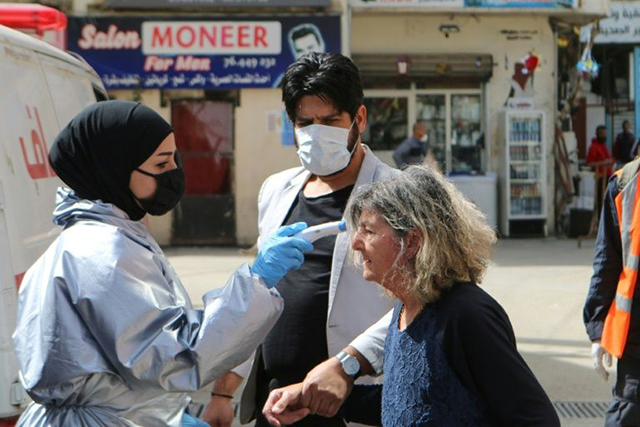- International News
- Thu-2020-04-23 | 04:47 pm

The patient, a Palestinian refugee from Syria, has been taken to the state-run Rafic Hariri hospital in Beirut, the UN agency for Palestinian refugees, UNRWA, said in a statement late Tuesday.
Medical experts visited the Wavel camp in the eastern Bekaa Valley on Wednesday to carry out tests, Lebanon's official National News Agency said.
The testing was to focus on the woman's relatives and people she has interacted with, as well as 50 others chosen arbitrarily "inside the camp and its surroundings", it said.
Inside a clinic, a nurse in blue and white personal protection gear took a nasal swab from a man who winced as he lay in a consultation chair, an AFP journalist said.
Workers in blue hazmat suits sprayed disinfectant at an entrance to the camp, also called Al Jalil.
In coordination with Lebanese security forces, Palestinian factions in charge of security have imposed a lockdown on the camp, preventing anyone from entering or leaving, the NNA report said.
It said cars drove around the camp's densely-populated neighbourhood as messages blared from loudspeakers urged residents to stay indoors.
A member of a popular committee living inside the camp told AFP all shops had closed.
Lebanon has officially announced 682 infections including 22 deaths across the country.
The United Nations and aid groups have repeatedly warned that refugees and migrants in crowded camps worldwide are at special risk of the new coronavirus.
More than 70 million people globally have been forced by conflict, persecution, violence and abuses to flee their homes, including more than 20 million living as refugees, according to UN data.
Weak sanitation, cramped conditions
More than 2,000 people live in Wavel, according to statistics released by Lebanon's government after a 2017 census, but the UN agency says the population of those registered in the camp are much higher.
Aid groups have warned that hundreds of thousands of Palestinian and Syrian refugees living in Lebanon's overcrowded camps are the most vulnerable and that self-isolating patients in the camps where sanitation is weak would be one of the top challenges.
"The main concern remains... the spread of coronavirus in the overcrowded Palestine refugee camps where there are very limited possibilities for home isolation," an UNRWA spokeswoman said earlier this month.
More than 174,000 Palestinians live in Lebanon, according to official figures, with most residing in camps ruled by Palestinian factions beyond the reach of Lebanese security forces.
But unofficial estimates say the Palestinians, whose forefathers fled the creation of the state of Israel in 1948, could number as many as 500,000.
They face work restrictions and many live hand to mouth from daily wages.
Lebanon says it also hosts 1.5 million Syrians since civil war broke out in the neighbouring country nine years ago, nearly one million of whom are registered with the United Nations as refugees.
One other Palestinian, who does not live in a camp, and three Syrians had previously tested positive in Lebanon for COVID-19.













